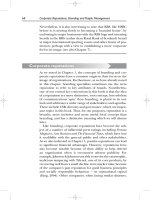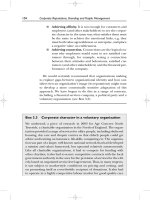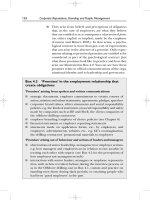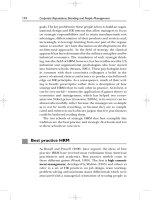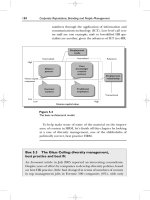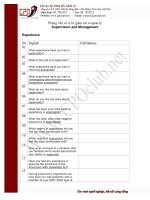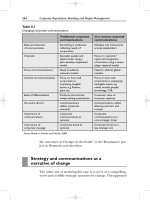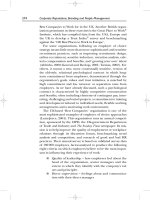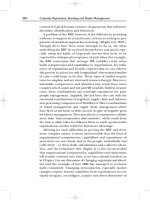Selling and sales management docx
Bạn đang xem bản rút gọn của tài liệu. Xem và tải ngay bản đầy đủ của tài liệu tại đây (39.22 KB, 4 trang )
Buy this file from />CHAPTER 14
Selling and sales management
BILL DONALDSON
Introduction
The role of selling is continuing to change and
evolve in response to dramatic moves in the
way buyers and sellers interact. Individual
knowledge, skills and abilities are still required,
perhaps more than ever, but teamwork and
technology are also vital ingredients in an
effective organizational response to the needs
and demands of customers. The salesforce have
always been ambassadors for their firm, but in
a turbulent business environment the informa-
tion and persuasion role of salespeople is being
absorbed into their relationship role. Sales-
people must take responsibility for creating,
developing and maintaining profitable relation-
ships with their customers. This being so, the
need is paramount to focus on how to win,
develop and retain customers to achieve the
marketing and sales objectives of the firm. This
puts the spotlight once again on the role of
selling in the marketing mix and on the
management of sales operations. Sales opera-
tions are the revenue generation engine of the
organization and thus have a direct impact on
the success of the firm. In this chapter, we
consider how selling is changing and evolving.
We examine the new role of salespeople and
redefine the sales encounter in different
exchange situations. We then address some of
the key issues in managing the salesforce as
they relate to marketing.
The changing role of salespeople
Consider the following statistics. In 1970, 80 per
cent of grocery products were sold to 1656
buying points, the remaining 20 per cent to
thousands of smaller units. By 1980, 80 per cent
of grocery products were purchased from only
656 buying points. Today, 80 per cent is bought
from only five major buying points (Keynote,
1998). Less dramatic but similar trends can be
found across industries, and the effects on
salespeople and on the efficiency of sales
operations has been radical. These changes
imply a new perspective for integrating sales
and other forms of communication with the
operational side of the business. Driven by an
urgency arising from more complex supply
chains, fewer and larger purchase points, the
availability and use of IT in customer contact
operations, relative increased costs of labour,
and the continuing internationalization of busi-
ness, sales operations are now different. These
factors contribute positively to the need for
more efficient exchange and communication
Buy this file from />Buy this file from />Selling and sales management 361
systems between firms and their customers,
predicated by increases in the costs of acquiring
new customers, and the need to retain the
existing customer base and stimulate the pur-
chasing power of those customers already on
the books.
Personal selling can be defined as the
personal contact with one or more purchasers
for the purpose of making a sale. To be effective,
marketing management needs to integrate per-
sonal selling with other promotional elements,
with other organizational functions such as
distribution and production, and with the
customer and competitive structures prevailing
in the market. The importance of personal
selling is such that expenditure on the salesforce
usually exceeds the budget for all other market-
ing communications activities added together,
with the possible exception of advertising in
large, fast-moving consumer goods companies
or direct marketing organizations.
Personal selling has several interrelated
roles within the communications mix. The
information role is part of a two-way process
whereby information about the company’s
product or offer needs to be communicated to
existing and potential customers and, in the
reverse direction, customers’ needs are cor-
rectly interpreted and understood by manage-
ment. Salespeople impart knowledge about
products or services which provide benefits to
customers, and also a range of information on
promotional support, finance, technical advice,
service and other elements which contribute to
customer satisfaction. Salespeople are also the
face-to-face contact between purchasers and the
company, and for good reason are referred to as
‘the eyes and ears of the organization’, since
senior management’s customer contact may be
limited.
A second role salespeople must fulfil is
persuasion. The importance of correctly identi-
fying customers’ needs and market opportun-
ities cannot be overstated. Nevertheless, in
competitive markets, prospective customers are
usually faced with an abundance of choice. As
a result, adoption of the marketing concept can
be no guarantee of competitive advantage.
Purchasers will have to be convinced that the
company has correctly identified their needs
and that the offer provides benefits over any
other firm. Salespeople are part of this process
through persuasion and service.
A third role is relationship building, and
salespeople must initiate, build and develop
relationships between the firm and its custom-
ers. Owing to their boundary-spanning role,
the salesforce of a company has traditionally
been a vital link between the firm and its
customers, and a prime platform for commu-
nicating the firm’s marketing message and the
voice of the customer to the firm. In the high-
tech world, it is easy to overlook the impor-
tance of personal relationships and how the
interaction with customers has changed, if at
all. Salespeople have always realized the
importance of relationships, but there is now
evidence that salespeople’s and customer’s
understanding of each other may not be accu-
rate (Sharma, 2000). Therefore, the manage-
ment task is to re-engineer sales practices to
maximize the salesforce potential in this new
environment.
The nature of the personal selling task is
continuing to change in that selling to custom-
ers has been replaced by co-operating with
customers. The goals and objectives for the
salesperson have also changed from achieving
or exceeding target, selling X products in Y
period and maximizing earnings, to that of
building repeat business with the firm’s exist-
ing and potential customer base. The emphasis
has shifted from ‘closing’ the singular sale to
creating the necessary conditions for a long-
term relationship between the firm and its
customers that breeds successful sales encoun-
ters in the long run. This shift renders obsolete
many of the currently available sales manage-
ment practices, and the sales philosophy and
culture that has driven the development of the
sales management field for decades. It also
questions sales performance measures based on
individual criteria and sales management prac-
tices which reflect recruitment, training and
Buy this file from />Buy this file from />362 The Marketing Book
rewards based on sales volumes rather than
relationship performance. The role of the sales-
person seems to have moved away from tradi-
tional aggressive and persuasive selling, to a
new role of ‘relationship manager’ and, in
practice, we are witnessing a tendency to
change the sales lexicon from salesforce to sales
counsellors, professional representatives or
sales consultants (Manning and Reece, 1992;
DeCormier and Jobber, 1993). Perhaps the
change in the title is designed to facilitate the
transition of the salesforce’s tasks from selling
to advising and counselling, from talking to
listening and from pushing to helping, as
suggested by Pettijohn et al. (1995). Recent
evidence suggests that often the idea of syner-
gistic relationships and partnerships is slower
than hoped for by participants. The expected
benefits from developing closer relationships
also fail to materialize in the ways expected
(Marsh, 2000). This transition is not only a
matter of title. The new reality of relationship
marketing directs salespeople and sales man-
agers to develop long-lasting relationships with
their customers based on mutual trust and
commitment (Morgan and Hunt, 1994).
The costs of personal selling
According to a 2001 survey, the average cost of
an outside salesperson is in excess of £55 000
per annum (Reward Group/Institute of Sales
and Marketing Management, 2001). Yet the
time actually spent face to face with customers
is typically around 20–30 per cent of working
hours. This raises the question of what form of
communication is both effective and efficient in
today’s marketplace. The most significant dif-
ference between selling and other elements in
the marketing communications mix is the per-
sonal contact, but this comes with a relatively
high price tag. The need for this personal
contact will vary depending on such factors as
the scale of risk, size of investment, type of
customer, frequency of purchase, newness of
product and many other factors. In some
situations the information or persuasion role
can be achieved by impersonal means of
communication, particularly advertising.
Advertising is impersonal, indirect and
aimed at a mass audience, whereas selling is
individual, direct and much more adaptable.
With advertising the message is more limited,
cheaper per contact but unidirectional, relying
on a pull approach rather than personal selling,
which is two-way, but employs a push strategy
and is relatively expensive per contact. Today,
yet another dimension needs to be considered.
This is the role and position of direct marketing
as a form of communications. In Table 14.1, we
compare advertising, direct marketing and
personal selling.
Therefore, a primary task of management
is to be clear on the role of personal selling and
what exactly it is we want salespeople to do.
Information technology (IT) is the set of tech-
nologies related to the processing and commu-
nication of information, including computer
and electronic databases, advanced telecommu-
nications, CD-ROMs and the Internet. These
technologies have led to new and powerful
ways to reach customers and are changing the
way firms interact.
The use of marketing databases, telemar-
keting and the Internet is having a significant
impact on how sales operations are managed
and will continue to do so. For example, the
Internet is a powerful tool for providing infor-
mation and will be an important means of
buyer–seller communication. Many traditional
intermediaries, particularly those who do not
stock a physical product, will find that con-
sumers empower themselves to collect infor-
mation and make the purchase decision. This
changes the information role of salespeople,
and travel agencies, car dealerships and finan-
cial intermediaries are likely to be most affected
by such a process. The demand for secondary
sources of information is passing from a num-
ber of individual and independent sources to
software programs which can browse the Inter-
net and report the findings directly to users
Buy this file from />The publisher detailed in the title page holds the copyright for this document
All rights reserved. No part of this publication may be reproduced, stored in a retrieval system, or transmitted,
in any form or by any means, electronic, mechanical, photocopying, recorded or otherwise, without the written
permission of Spenford IT Ltd who are licensed to reproduce this document by the
publisher
All requests should by sent in the first instance to
Please ensure you have book-marked our website.
www.download-it.org
Chapter extract
To buy the full chapter, and for copyright
information, click here
/>
